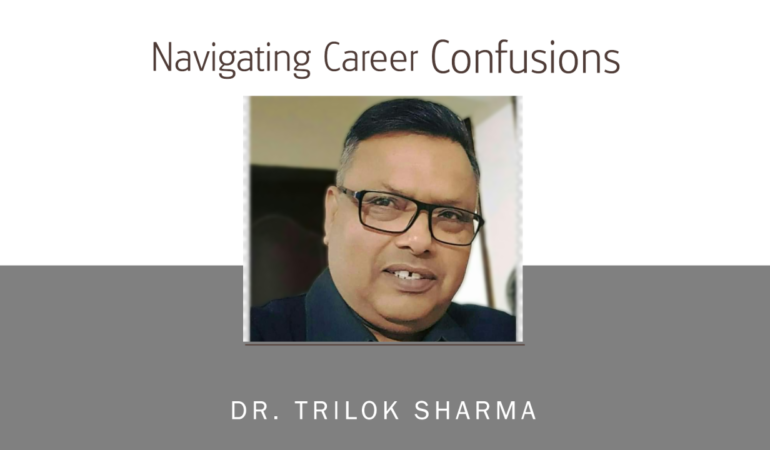A Comprehensive Guide for Students, Job Aspirants, and Professionals
Career confusion is a common experience, affecting individuals at various stages of their professional journey. Whether you are a student selecting a course, a job aspirant deciding on a career path, or a working professional contemplating a change, dealing with career confusion can be daunting. Through this article, I am going to offer insights and strategies tailored to each group, with relevant real life examples (the names of persons and place are not real for professional reasons).
For School and College Students
Understanding Interests and Aptitudes
Identify Your Passion:
- Students often struggle to choose a stream or course that aligns with their interests and strengths. It’s crucial to explore different subjects and activities to identify what excites you. For instance, if you find joy in solving mathematical problems, a career in engineering or data science might be a good fit.
Seek Guidance:
- Consult with teachers, career counselors, and family members. Schools like The Doon School in Dehradun offer career counseling sessions that help students identify their strengths and suitable career paths.
- You should also go for a Psychometric assessment with Vocademics International LLP (https://vocademics.edumilestones.com).
Real-Life Example:
Priya, a student from Udaipur – Rajasthan, was confused between pursuing medicine and engineering. Through aptitude tests and counseling at her school, she discovered her inclination towards biology and human anatomy. This realization helped her choose a medical career, where she now excels as a successful doctor.
For Job Aspirants
Research and Networking
Conduct Thorough Research:
- Understanding the job market and the demand for various professions is essential. Utilize resources like LinkedIn, Naukri (dot) com, and Glassdoor to gather information about job roles, required skills, and industry trends.
Build a Network:
- Networking is vital in today’s job market. Attend industry seminars, webinars, and workshops. Join professional groups on LinkedIn to connect with industry experts and gain insights into different career paths.
Take a Professional Aptitude Assessment
You should also go for Career Inclination Index test, it will help you in identifying your interest, abilities, skills, personality, learning style and career aptitude. You can take this test at Vocademics International LLP (https://vocademics.edumilestones.com).
Real-Life Example:
Rohan, a fresh graduate from Rajkot-Gujarat, was unsure whether to pursue a career in marketing or finance. By attending industry seminars and networking events, he connected with professionals from both fields. Then based on the insights gained from his counselor and mentor, he decide on a marketing career, where he now works as a digital marketing executive at a leading firm.
For Working Professionals
Self-Assessment and Skill Development
Evaluate Your Current Job:
- Assess your current role and identify what aspects you enjoy or dislike. This self-assessment can clarify whether a career change is necessary or if skill enhancement in your current field could lead to job satisfaction. You should also go for your Professional interest Evaluation, and EQ /IQ assessment with Vocademics International LLP (https://vocademics.edumilestones.com).
Pursue Continuous Learning:
- Enroll in courses and certifications to update your skills. Platforms like Coursera and Udemy offer specialized courses that can help you pivot to a new career or advance in your current one.
Real-Life Example:
Anita, a software engineer in Bangalore, felt stagnant in her role. After evaluating her interests, she realized her passion for project management. She pursued a certification in project management and successfully transitioned to a project manager role in her company, leading to greater job satisfaction and career growth.
General Strategies for Dealing with Career Confusions
Mentorship
Seek Mentors:
- A mentor can provide valuable guidance and support. In India, platforms like MentorKart connect mentees with industry experts who offer personalized career advice.
Practical Experience
Internships and Part-Time Jobs:
- Gaining practical experience through internships and part-time jobs can provide clarity about different career options. Many Indian companies offer internships that allow students and job aspirants to explore various fields before making a decision.
Decision-Making Frameworks
SWOT Analysis:
- Conduct a SWOT analysis (Strengths, Weaknesses, Opportunities, Threats) for each career option. This analytical approach can help in making informed decisions.
Real-Life Example:
Sunita, a marketing professional in Ahmedabad-Gujarat, was confused about switching to a content writing career. By conducting a SWOT analysis and seeking advice from mentors from Vocademics International LLP, she confidently made the transition and now enjoys a fulfilling career as a content strategist.
Embrace the journey of self-discovery and make informed decisions to achieve career satisfaction and success with the help of Vocademics International LLP.

